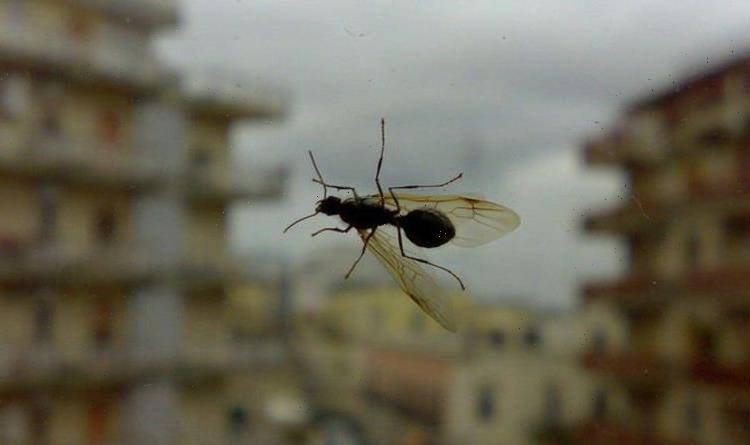Ants grow WINGS on Flying Ant Day
We use your sign-up to provide content in ways you’ve consented to and to improve our understanding of you. This may include adverts from us and 3rd parties based on our understanding. You can unsubscribe at any time. More info
Flying ants emerge for unspecified days during the summer people have come to know as Flying Ant Day. The day, which changes every year, will see the ants flock from their nests in their millions when the weather is at its most humid. Unfortunately, people eating outside or just trying to exist with their windows open may find their days ruined by the floating Formicidae.
How to get rid of flying ant infestations
Although they are a temporary presence during the summer, flying ants can leave permanent damage.
The primary intention of Flying Ant Day is for queens and young males to mate.
As such, the ants look for a new nest and may attempt to establish one in people’s homes.


Swat them
One of the most tried and tested methods for eliminating flying ants is swatting them.
Experts state ants tend not to respond to traditional baits, so swatting with a rolled-up newspaper or purpose-built tools are a reasonable replacement.
Anyone searching for a quicker method could use a vacuum.

Use flypaper
People tend to reserve fly paper for houseflies, but they work just as well on flying ants.
The commercial types bait ants where other products may fail, but there are natural alternatives.
Anyone without flypaper to hand can use duct tape laid sticky side up to catch ants where they enter the home.
DON’T MISS
Maggots and insect burgers must be mass produced to fight malnutrition – ANALYSIS
How can you tell if it’s an Asian giant hornet and what should you do? – EXPLAINER
How to stop insect bites itching – 4 quick at-home remedies – INSIGHT

Use a peppermint spray
Insects dislike some pungent scents or flavours, and peppermint is amongst their least favourites.
People with a spare spray bottle can use a mixture of peppermint oil and dish soap, which will effectively ward off invading ants.
If the spray hits any of the insects, it will dehydrate and kill them.
Find and plug the source
Many of the above methods will allow people to address the swarms as they emerge.
But any industrious ants that infest homes will establish a nest from which they will continue to reproduce.
People need to find and eradicate the colony (either themselves or with professional help) before sealing any entryways.
Source: Read Full Article
